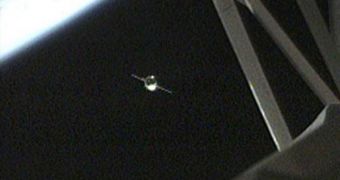For the first time in nearly nine years, the Russian space agency, RosCosmos, has delivered a new module for the International Space Station (ISS). Named Poisk, which stands for “explore” in Russian, the new component was launched on Tuesday, from the Baikonur Cosmodrome, in Kazakhstan. It spent two days in orbit, catching up with the space station, until finally docking on it yesterday, at 10:41 am EST (1541 GMT). The maneuver took place just four days before NASA's scheduled flight of space shuttle Atlantis, which will lift off on November 16 from the Launch Pad 39A facility, at the Kennedy Space Center, in Florida.
Poisk, which is also known as the Mini-Research Module 2, is one of the two new Russian modules to be added to the ISS. The last contribution from the country was made in 2001, when the Pirs module was affixed to the orbital outpost. With the latter scheduled to reach the end of its life cycle in 2011, replacements need to be flown in its stead. The second Russian mini-module, MRM-1, will be launched next year, most likely aboard a space shuttle assembly mission. Meanwhile, the first component of the series docked on the laboratory while the two spacecraft were flying 222 miles (357 kilometers) over northern Kazakhstan, Space reports.
“The arrival of this new module for the Russian segment went great,” astronaut Maxim Suarev radioed to the Russian Mission Control RosCosmos. He is a part of the six-member crew currently aboard the station, forming Expedition 21. Together with cosmonaut and ISS flight engineer Roman Romanenko, Suarev was expected to take charge of operating the inbound Poisk module, if anything was to go awry with its navigation system. However, the automated docking procedure went smoothly, so their intervention was not required.
The most important addition that Poisk brought to the ISS was a fourth Russian docking port, bringing the total number of these structures to five. An additional, American-built one houses the space shuttles when they come to visit. Four Russian ports may seem excessive, but two of them are constantly occupied by two Soyuz space capsules, which act as life boats for the ISS crew. An additional one is usually occupied by a Progress unmanned cargo spacecraft, which delivers supplies, so no free opening was available in case of an emergency flight.

 14 DAY TRIAL //
14 DAY TRIAL //